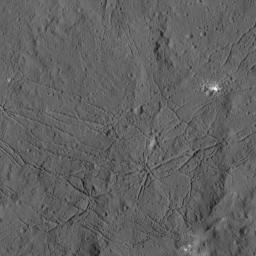
|
Floor of Dantu Crater from LAMO
- Click the image above for a larger view
- Full-Res JPEG (1024 x 1024) (137.8 kB)
- Full-Res TIFF (1024 x 1024) (1.0 MB)
Caption:
The fractured floor of Dantu Crater on Ceres is seen in this image from NASA's Dawn spacecraft. Similar fractures are seen in Tycho, one of the youngest large craters on Earth's moon. This cracking may have resulted from the cooling of impact melt, or when the crater floor was uplifted after the crater formed.
Dantu was imaged earlier in Dawn's science mission at Ceres -- during Survey orbit (see PIA19609 ) and from the high altitude mapping orbit, or HAMO (see PIA19993 ).
Dawn took this image on Dec. 21 from its low-altitude mapping orbit (LAMO) at an approximate altitude of 240 miles (385 kilometers) above Ceres. The image resolution is 120 feet (35 meters) per pixel.
Background Info:
Dawn's mission is managed by JPL for NASA's Science Mission Directorate in Washington. Dawn is a project of the directorate's Discovery Program, managed by NASA's Marshall Space Flight Center in Huntsville, Alabama. UCLA is responsible for overall Dawn mission science. Orbital ATK, Inc., in Dulles, Virginia, designed and built the spacecraft. The German Aerospace Center, the Max Planck Institute for Solar System Research, the Italian Space Agency and the Italian National Astrophysical Institute are international partners on the mission team. For a complete list of acknowledgments, see http://dawn.jpl.nasa.gov/mission .
For more information about the Dawn mission, visit http://dawn.jpl.nasa.gov .
Cataloging Keywords:
| Name | Value | Additional Values |
|---|---|---|
| Target | 1 Ceres | |
| System | Main Belt | |
| Target Type | Dwarf Planet | Asteroid |
| Mission | Dawn | |
| Instrument Host | Dawn | |
| Host Type | Orbiter | |
| Instrument | Framing Camera (FC) | |
| Detector | ||
| Extra Keywords | Crater, Grayscale, Impact | |
| Acquisition Date | ||
| Release Date | 2016-01-12 | |
| Date in Caption | ||
| Image Credit | NASA/JPL-Caltech/UCLA/MPS/DLR/IDA | |
| Source | photojournal.jpl.nasa.gov/catalog/PIA20193 | |
| Identifier | PIA20193 | |
